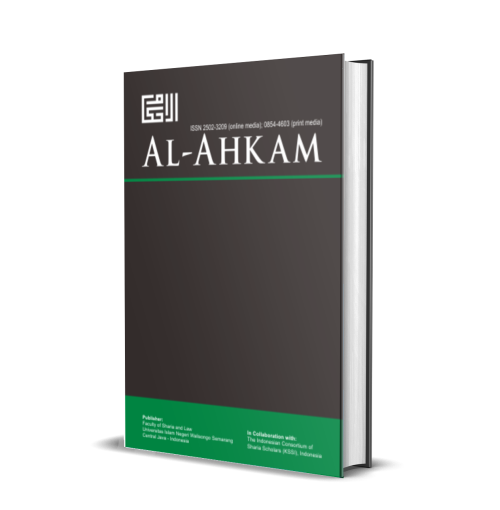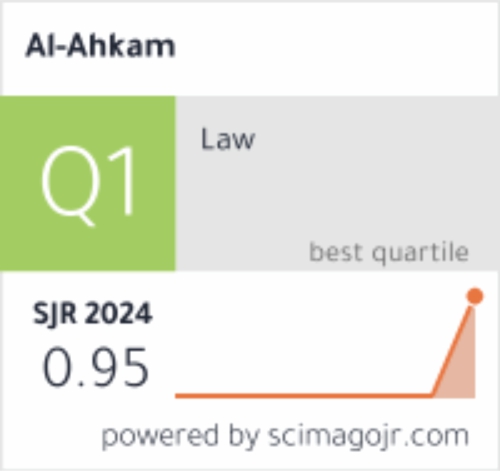Modern Law Aspect on Procedural Decision of Sultan Adam Law
DOI:
https://doi.org/10.21580/ahkam.2019.29.2.4285Keywords:
law history, Sultan Adam Law, modern law, procedural decisionAbstract
The main focus of this research was analyzing the normative procedural decision of Sultan Adam Law which was applied by Sultan Adam during 1835 AD. Its emergence was for strengthening Islam Aqeedah for its believers and clinging on to Syafii Madhhab. Sultan Adam Law was remarkable to scrutinize, especially when associated with the modern law aspect. By employing the law history approach, this research attempted to respond to Sultan Adam Law procedural decision document issues which were associated with the modern law aspect. It could be seen through several sides such as political law, law substance, arrangement system as well as procedural aspect. The research also responded on how several factors explained Sultan Adam Law included in modern law. Based on the analysis result, it could be concluded that Sultan Adam Law was a written law decision which its existence in Banjarese people contained principles and legal norms as well as several procedural law decisions in a modern way. Although it was simple systematics which did not classify based on article and section, it contained several decision or principles and legal norms.
Downloads
References
Abdurrahman, Abdurrahman. “UNDANG-UNDANG SULTAN ADAM 1835 DALAM PERSPEKTIF SEJARAH HUKUM.” Al-Banjari: Jurnal Ilmiah Ilmu-Ilmu Keislaman 12, no. 1 (2015).
Abrams, Douglas E., Naomi Cahn, Catherine J. Ross, David D. Meyer, and Linda C. McClain. “Contemporary Family Law” (2015).
Adji, Oemar Seno. “PERKEMBANGAN DELIK KHUSUS DALAM MASYARAKAT YANG MENGALAMI MODERNISASI.” Jurnal Hukum & Pembangunan (1980).
Ahyat, Ita Syamtasiyah. “Perkembangan Islam Di Kesultanan Banjarmasin.” SOSIOHUMANIKA 8, no. 1 (2015).
Armia, Muhammad Siddiq. “Sumbangsih Kerajaan Muslim Indonesia Dalam Pengembangan Peradilan Islam: Analisis Historical Legal Approach.” Jurnal Justisia: Jurnal Ilmu Hukum, Perundang-undangan dan Pranata Sosial 2, no. 2 (2018): 172–189.
Buchanan, Allen. “Institutional Legitimacy.” Oxford studies in political philosophy 4 (2018): 53–78.
Bulmer, Martin. Sociological Research Methods. Routledge, 2017.
Coolhaas, W. Ph. A Critical Survey of Studies on Dutch Colonial History. Springer Science & Business Media, 2013.
Coulson, Noel. A History of Islamic Law. Routledge, 2017.
Dahlen, Ashk. Islamic Law, Epistemology and Modernity: Legal Philosophy in Contemporary Iran. Routledge, 2004.
Deflem, Mathieu. Habermas, Modernity and Law. SAGE, 1996.
Dekker, Sidney WA, and Hugh Breakey. “‘Just Culture:’Improving Safety by Achieving Substantive, Procedural and Restorative Justice.” Safety Science 85 (2016): 187–193.
Duguit, Leon. Revival: Law in the Modern State (1921). Routledge, 2018.
Erp, Herman H. H. van. Political Reason and Interest: A Philosophical Legitimation of the Political Order in a Pluralistic Society. Routledge, 2018.
Finkelman, J., and A. V. Dicey. “Introduction to the Study of the Law of the Constitution.” The University of Toronto Law Journal (2006).
George, Robert P. “Recent Criticism of Natural Law Theory.” In Aquinas and Modern Law, 35–86. Routledge, 2017.
Gunawan, Hendra. “POTRET PERJALANAN HUKUM ISLAM DI INDONESIA.” Jurnal AL-MAQASID: Jurnal Ilmu Kesyariahan dan Keperdataan 4, no. 1 (2018): 43–60.
Jassin, Suparman. “Sejarah Peradilan Islam.” Bandung: Pustaka Setia (2015).
Jaya, Nyoman Serikat Putra. “Hukum (Sanksi) Pidana Adat Dalam Pembaharuan Hukum Pidana Nasional.” Masalah-Masalah Hukum 45, no. 2 (2016): 123–130.
Kantaprawira, Rusadi. “Sistem Politik Indonesia.” Bandung: Sinar Baru Algesindo (2004).
Kramer, Henry S. Alternative Dispute Resolution in the Work Place. Law Journal Press, 2016.
Kurdi (ed), khmad Satori dan Sulaiman. Sketsa Pemikiran Politik Islam. Deepublish, 2016.
Lev, Daniel S. “Colonial Law and the Genesis of the Indonesian State.” In Law and Society in East Asia, 3–20. Routledge, 2017.
Mahfud, Moh. “Islam, Lingkungan Budaya, Dan Hukum Dalam Perspektif Ketatanegaraan Indonesia.” KARSA: Journal of Social and Islamic Culture 24, no. 1 (2016): 1–14.
McCrudden, Christopher. “Legal Research and the Social Sciences.” In Legal Theory and the Social Sciences, 149–167. Routledge, 2017.
Mulyadi, Lilik. “Eksistensi Hukum Pidana Adat Di Indonesia: Pengkajian Asas, Norma, Teori, Praktik Dan Prosedurnya.” LITIGASI 17, no. 2 (2016): 3284–3313.
Noorlander, Johannes Cornelis. “Bandjarmasin en de Compagnie in de tweede helft der 18de eeuw.” 1935.
Ridha, M. Faqih. “POTRET LAIN PERJALANAN HUKUM DI KERAJAAN BANJAR.” Al-Banjari: Jurnal Ilmiah Ilmu-Ilmu Keislaman 12, no. 1 (2015).
Selznick, Philippe Nonet dan Philip. Hukum Responsif, 2011.
Shestack, Jerome J. “The Philosophic Foundations of Human Rights.” In Human Rights, 3–36. Routledge, 2017.
Shomad, Abd. Hukum Islam: Penormaan Prinsip Syariah dalam Hukum Indonesia. Kencana, 2017.
Steenbrink, Karel A. “Aspek Tentang Islam Di Indonesia Abad Ke 19.” Biljilbad 1892 (1866).
Teubner, Gunther. “How the Law Thinks: Toward a Constructivist Epistemology of Law.” In Legal Theory and the Social Sciences, 205–235. Routledge, 2017.
Ushulha, Nisa. “KERAJAAN BANJAR DAN PERANG BANJAR (1859-1905 M).” PhD Thesis, UIN Sunan Ampel Surabaya, 2016.
Wibowo, Ari. “INDEPENDENSI KEJAKSAAN DALAM SISTEM PERADILAN PIDANA INDONESIA.” Istinbath: Jurnal Hukum 12, no. 1 (2015): 1–19.
Wiratraman, Herlambang Perdana. “Politik Hukum Peradilan Adat.” Mimbar Hukum-Fakultas Hukum Universitas Gadjah Mada 30, no. 3 (2018): 488–503.
“MEMBANGUN KEHIDUPAN DEMOKRASI MELALUI PENDIDIKAN KEWARGANEGARAAN.” Citizenship: Jurnal Pendidikan Pancasila dan Kewarganegaraan 2, no. 1 (2013): 112–118.
Downloads
Published
How to Cite
Issue
Section
License
By submitting an article to the journal, the author(s) agree to transfer the published article's copyright to the journal, which will act as the publisher. This means the journal will have the right to publish the article in various forms, including reprints. The journal will maintain the publishing rights to the published articles.
In line with the license, authors and third parties (readers, researchers, and others) are allowed to share and adapt the material. In addition, the material must be given appropriate credit, provided with a link to the license, and indicated if changes were made. If authors remix, transform or build upon the material, authors must distribute their contributions under the same license as the original.




